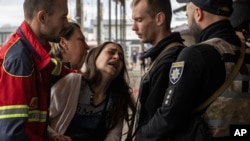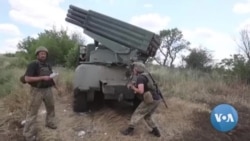Russian forces are again pounding Ukrainian cities with long-range strikes, just a day after Russia’s foreign minister warned that Moscow is preparing to expand its war in Ukraine beyond the Donbas.
Ukrainian officials Thursday said Russian shelling hit multiple districts, including a market in Kharkhiv, Ukraine’s second largest city, killing three people and wounding 23 others.
Regional governor Oleg Synegubov said the dead included one child, while police and other officials said there were no military targets in the area.
“The Russian army is randomly shelling Kharkiv, peaceful residential areas, civilians are being killed,” Mayor Ihor Terekhov said.
Also Thursday, Donetsk regional governor Pavlo Kyrylenko told the Reuters news agency that Russian missile strikes destroyed two schools in Ukrainian-held Kramatorsk and Kostiantynivka, while at least one missile hit the city of Bakhmut.
The renewed shelling and missile strikes come just one day after Russian Foreign Minister Sergey Lavrov told state-run media outlets that Russia is looking to expand operations due to ongoing weapon deliveries to Ukraine from the United States and other Western countries.
“Now, the geography has changed,” Lavrov told the state news RT television and RIA Novosti news agency. “It's not just Donetsk and Luhansk. It's Kherson, Zaporizhzhia and several other territories. This process is continuing, consistently and persistently.”
Western intelligence officials, however, are casting doubt on Russia’s ability to make good on its threat.
"I think they're about to run out of steam," Richard Moore, the chief of Britain’s MI6 intelligence service, told an audience at the annual Aspen Security Forum in Aspen, Colorado Thursday.
"Our assessment is that the Russians will increasingly find it difficult to supply manpower, material over the next few weeks," he said. "That will give Ukrainians the ability to strike back."
Estonia’s foreign intelligence chief echoed similar sentiments late Wednesday.
“I am cautiously confident that Ukraine will defeat the Russian army in Ukraine sooner or later,” Mikk Marran, the director-general of Estonia’s Foreign Intelligence Service, told the Aspen Forum.
“It will not come easily. It will take time and Ukraine probably might not be able to liberate all of the occupied territories, but strategically speaking Putin will not succeed,” he added.
Britain’s defense ministry said Thursday that Russian forces were continuing small-scale assaults along the front line in the Donbas region, the part of eastern Ukraine that has been a focus of its war.
The ministry said in its daily assessment that Russia was likely closing in on the Vuhlehirska power plant, northeast of Donetsk, and that Russian forces were prioritizing capturing critical infrastructure sites.
The U.S. Wednesday announced plans to send four more such rocket systems to Ukraine, along with more artillery rounds.
“Ukrainian forces are now using long-range rocket systems to great effect, including HIMARS provided by the United States, and other systems from our allies and partners,” U.S. Defense Secretary Lloyd Austin said Wednesday at the Pentagon. “Ukraine's defenders are pushing hard to hold Russia’s advances in the Donbas.”
General Mark Milley, chairman of the Joint Chiefs of Staff, said the Ukrainians have been using U.S.-supplied multiple rocket launchers to hit Russian command centers and supply lines.
“The Ukrainians are making the Russians pay for every inch of territory that they gain,” Milley said, and the Donbas is “not lost yet. The Ukrainians intend to continue the fight.”
The future, Milley said, will depend on the number of long-range rockets and ammunition the Ukrainians have.
"We have a very serious grinding war of attrition going on in the Donbas. And unless there's a breakthrough on either side — which right now the analysts don't think is particularly likely in the near term — it will probably continue as a grinding war of attrition for a period of time until both sides see an alternative way out of this, perhaps through negotiation or something like that."
Some information for this report came from The Associated Press, Agence France-Presse and Reuters.







